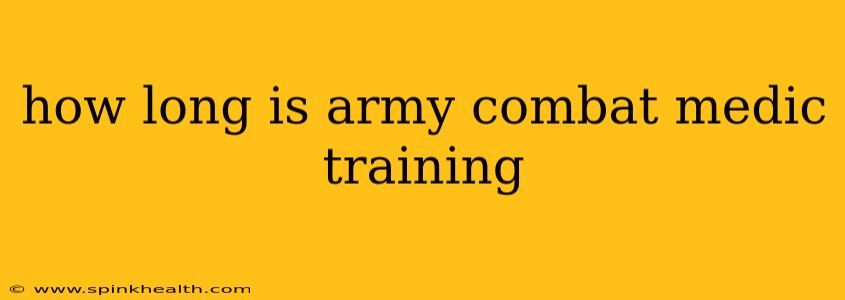How Long is Army Combat Medic Training? A Journey into Saving Lives
The path to becoming an Army Combat Medic is a demanding yet rewarding one, filled with rigorous training designed to equip soldiers with the skills to provide life-saving care in the most challenging environments. But just how long does this crucial training last? The answer isn't a simple number, as the total time commitment depends on several factors, including the individual's prior medical experience and the specific training pathways they follow.
Let's embark on a journey to uncover the specifics of this vital training program.
What is the Basic Combat Medic Course (BCMC)?
The core of Army Combat Medic training is the Basic Combat Medic Course (BCMC). This intensive program lays the foundation for all combat medics, instilling essential skills and knowledge. The BCMC typically lasts approximately 16 weeks. During this period, trainees receive instruction in a broad range of medical disciplines, including:
- Trauma care: Managing injuries from gunshot wounds, explosions, and other battlefield trauma.
- Emergency medical techniques: CPR, airway management, intravenous therapy, and wound care.
- Medical evacuation: Understanding procedures for safely transporting casualties to higher levels of care.
- Pharmacology: Administering medications and understanding their effects.
- Combat lifesaver skills: Providing immediate care before more advanced medical personnel arrive.
Beyond the BCMC: Advanced Training and Specialization
The 16-week BCMC is just the beginning. Depending on an individual's career goals and the Army's needs, further training may be required. This could include:
- Advanced medical training: Some medics may pursue specialized courses focusing on areas like critical care, operating room techniques, or specific medical specialties. These courses can significantly extend the overall training duration.
- Specialized deployments: Depending on the assignment, a medic might undergo additional training specific to the operational environment, such as wilderness medicine or austere environment medical care.
- Leadership roles: As medics progress in their careers, they may take on leadership roles, requiring additional training in management, supervision, and team leadership.
What about prior medical experience?
Soldiers with prior medical experience, such as EMTs or paramedics, may have some of their training waived or accelerated. This can shorten the overall time commitment, although it's unlikely to significantly reduce the BCMC's 16 weeks. The Army still requires all medics to meet a high standard of proficiency, regardless of their background.
How long is the total training time?
Therefore, while the BCMC itself is approximately 16 weeks, the total time spent in training to become a fully qualified Army Combat Medic can vary considerably, potentially extending beyond that initial period depending on specialized training and career progression.
What other training might a combat medic undergo?
H2: What other training might a combat medic undergo?
Army Combat Medics often receive further training beyond the BCMC. This can include specialized courses such as:
- Wilderness Medicine: Training for providing medical care in remote or challenging environments.
- Combat Trauma Care: Advanced techniques for treating severe injuries sustained in combat situations.
- Tactical Combat Casualty Care (TCCC): A standardized approach to battlefield trauma management.
These additional courses contribute to the medic's overall training duration and expertise.
Does the Army offer any advanced medical training opportunities?
H2: Does the Army offer any advanced medical training opportunities?
Absolutely! The Army provides opportunities for continued professional development and specialization. Medics can pursue advanced training in various fields, potentially leading to roles such as:
- Flight medic: Providing medical care in air ambulances.
- Critical care medic: Working in intensive care units or providing advanced trauma care.
- Operating room technician: Assisting surgeons in operating rooms.
These advanced opportunities require further training beyond the initial BCMC.
In conclusion, while the foundation of Army Combat Medic training, the BCMC, lasts approximately 16 weeks, the total training timeline is much more flexible and dependent on a multitude of factors. The commitment to becoming a highly skilled and capable Army Combat Medic is a journey that extends far beyond those initial 16 weeks.

